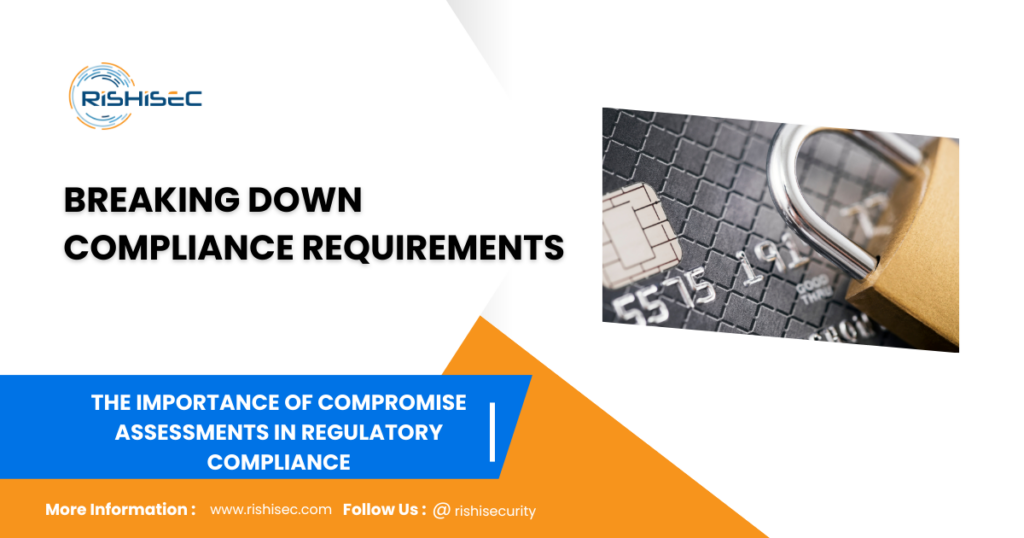Contents
The Importance of Compromise Assessments in Regulatory Compliance
Staying ahead of regulatory requirements is a dynamic challenge for organizations across industries. Compliance isn’t just about checking boxes; it’s about ensuring that sensitive data is protected against the evolving threat landscape. This highlights The Importance of Compromise Assessments in Regulatory Compliance, as these assessments prove invaluable in supporting your compliance efforts. By proactively identifying and addressing vulnerabilities, they offer a structured approach to both improving your cybersecurity posture and demonstrating compliance with regulations like HIPAA, PCI DSS, and GDPR. Furthermore, they provide the critical insights necessary for organizations to adapt to new regulatory changes, ensuring that security measures evolve alongside compliance mandates.
Breaking Down Compliance Requirements

To fully understand the impact of compromise assessments, it’s important to break down the regulatory frameworks that affect different industries. Let’s explore some key examples:
- HIPAA (Health Insurance Portability and Accountability Act): For healthcare organizations, HIPAA outlines strict security and privacy controls to protect patient data. Compromise assessments play a key role here, ensuring that vulnerabilities are detected and remediated before they can be exploited. Regular assessments not only help meet HIPAA’s ongoing monitoring and auditing requirements but also provide a solid defense in case of any security incidents.
- PCI DSS (Payment Card Industry Data Security Standard): For businesses handling payment card information, PCI DSS mandates continuous monitoring, vulnerability scanning, and a commitment to secure handling of credit card data. A compromise assessment supports PCI DSS compliance by identifying security gaps before they can result in a data breach or loss of consumer trust. Documenting these assessments as part of your security review helps demonstrate compliance during audits.
- GDPR (General Data Protection Regulation): The GDPR, designed to protect the personal data of EU citizens, imposes strict rules on organizations that handle such information. One key element is the ability to demonstrate data protection measures are in place. A thorough compromise assessment can reveal vulnerabilities in your infrastructure that may violate GDPR’s stringent standards, helping you prevent non-compliance fines.
From Detection to Prevention: The Power of Proactive Assessments

A key advantage of compromise assessments is their proactive nature. Instead of waiting for a breach to occur and then scrambling to fix it, these assessments focus on detecting potential security issues before they lead to a compromise. They go beyond vulnerability scans by also identifying indicators of compromise (IoCs) — subtle signs that a system might already be breached. For organizations with stringent regulatory obligations, this is critical. The ability to act on IoCs early can save millions in potential fines or reputational damage.
The proactive mindset is crucial when dealing with regulatory bodies that expect not only swift reaction to breaches but preventative measures that reduce risk. For example, the GDPR enforces severe penalties for data breaches, but demonstrating that a compromise assessment had been conducted prior to an incident can showcase your commitment to data protection and potentially reduce liability.
Case Study: How a Compromise Assessment Helped a Healthcare Provider Maintain Compliance
Consider a large healthcare provider that regularly conducts compromise assessments as part of its security strategy. During one assessment, the team discovered signs of an intrusion. Because the assessment was proactive, they detected the intrusion early and safeguarded patient data before any breach occurred. This scenario highlights The Importance of Compromise Assessments in Regulatory Compliance. By documenting their efforts, the healthcare provider not only avoided potential HIPAA fines but also built a stronger, trust-based relationship with its patients, demonstrating a commitment to data security. This proactive approach mitigates risks, reinforces compliance, and enhances patient trust.
Steps to Integrate Compromise Assessments into Your Compliance Strategy

Now that we’ve explored the regulatory and security benefits of compromise assessments, let’s break down how to integrate them into your existing compliance framework:
- Conduct Regular Assessments: Make compromise assessments a regular part of your security strategy, rather than a one-off event. This ensures that you stay ahead of potential vulnerabilities and can provide up-to-date documentation of your efforts for any audits or regulatory reviews.
- Align with Regulatory Timelines: Understand the specific compliance timelines and audit schedules that apply to your industry. For example, PCI DSS requires quarterly vulnerability scans. A compromise assessment conducted in tandem with these timelines ensures you’re prepared for any review.
- Automate Reporting: Use tools and solutions that automate reporting on your security posture, ensuring that the results of your compromise assessments are easily accessible and formatted for regulatory purposes.
- Document Your Remediation Efforts: It’s not enough to identify vulnerabilities — regulatory bodies will want to see that you’ve taken concrete steps to remediate them. Be sure to document every action taken after a compromise assessment, creating an audit trail that demonstrates your commitment to compliance.
CTA
Achieving regulatory compliance can be complex, but SentryCA simplifies the process. Our comprehensive compromise assessment solution helps you identify vulnerabilities and ensures you meet industry-specific compliance standards like HIPAA, PCI DSS, and GDPR.
Secure your organization and maintain compliance by signing up for a free trial of SentryCA today. Our tailored assessments and real-time monitoring protect your most sensitive data while keeping you compliant with the latest regulations. Don’t wait for a breach to occur — start proactively safeguarding your organization now.
Conclusion
The regulatory landscape is constantly evolving, and organizations must keep up to avoid penalties, fines, and data breaches. Compromise assessments are a powerful tool in the compliance toolbox, helping organizations not only detect vulnerabilities but also meet the stringent requirements of laws like HIPAA, PCI DSS, and GDPR. By integrating these assessments into your security strategy, you can ensure both your data and your reputation remain protected.
With SentryCA’s free trial, you can take the first step toward building a stronger, more compliant security posture today.
Learn more about Cyber Security from this post, How to Use SIEM Tools in Compromise Assessments


